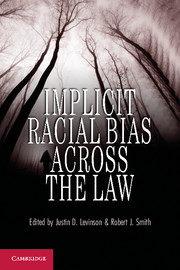Book contents
- Frontmatter
- Contents
- Contributors
- Acknowledgments
- Implicit Racial Bias Across the Law
- Introduction Racial Disparities, Social Science, and the Legal System
- 1 Implicit Racial Bias
- 2 Property Law
- 3 Criminal Law
- 4 Torts
- 5 Employment Law
- 6 Health Law
- 7 Education Law
- 8 Communications Law
- 9 Corporations Law
- 10 Tax Law
- 11 Intellectual Property
- 12 Environmental Law
- 13 Federal Indian Law
- 14 Capital Punishment
- 15 Reparations Law
- Index
- References
15 - Reparations Law
Redress Bias?
Published online by Cambridge University Press: 05 June 2012
- Frontmatter
- Contents
- Contributors
- Acknowledgments
- Implicit Racial Bias Across the Law
- Introduction Racial Disparities, Social Science, and the Legal System
- 1 Implicit Racial Bias
- 2 Property Law
- 3 Criminal Law
- 4 Torts
- 5 Employment Law
- 6 Health Law
- 7 Education Law
- 8 Communications Law
- 9 Corporations Law
- 10 Tax Law
- 11 Intellectual Property
- 12 Environmental Law
- 13 Federal Indian Law
- 14 Capital Punishment
- 15 Reparations Law
- Index
- References
Summary
As a widow, I have nothing. I lost my house, my animals, all my possessions.…I have found no work, my mind is full of [negative] thoughts. I ask my leaders to open their eyes and see my suffering.
Because of the inadequacies of the reparation process, the limitations of the reparations themselves, and the problems facing the rebuilding of South Africa, many women remain unhappy and less than fully “repaired.”
Introduction
Redress initiatives mark the global landscape. Governments faced with historic racial and gender injustice are attempting to build bridges from the past into the future by healing peoples’ persisting wounds and repairing lingering damage to society. Nations worldwide – South Africa, Canada, Peru, Guatemala, Chile, El Salvador, Timor-Leste, Argentina, Cambodia, Rwanda, and Sierra Leone – embark on far-reaching reparatory initiatives in the wake of systemic violence or long-term mistreatment of racial communities or indigenous peoples. Within the United States, African Americans, Native Americans, Native Hawaiians, Japanese, Latin Americans, Latino “Bracero” itinerant farm workers, Filipino U.S. World War II veterans, and indigenous Chamorus of the U.S. territory of Guam assert claims for reparatory justice.
These redress initiatives are salutary. They speak to the heart of a democracy's commitment to human rights and a fundamentally just society. Yet, as illuminated by the epigraph, something significant is often missing. Some, perhaps many, initiatives overlook key aspects of the larger injustice they ostensibly endeavor to redress – harms that are specific to women or women of color who are asking us to “open [our] eyes and see my suffering.” This chapter explores – and suggests further study of – one likely reason for this at least partial absence in the redress realm: implicit biases with deep cultural roots. Many redress policymakers and frontline advocates seem to treat women's and women of color's unique harms as of lesser consequence and therefore as less worthy (or unworthy) of repair. To illustrate, despite decades of extensive sexual violence during hostilities, the United Nations Security Council only recently characterized the mass rape of women as a crime against humanity warranting redress.
- Type
- Chapter
- Information
- Implicit Racial Bias across the Law , pp. 244 - 264Publisher: Cambridge University PressPrint publication year: 2012



